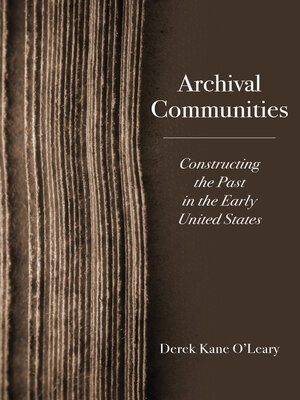
Sign up to save your library
With an OverDrive account, you can save your favorite libraries for at-a-glance information about availability. Find out more about OverDrive accounts.
Find this title in Libby, the library reading app by OverDrive.



Search for a digital library with this title
Title found at these libraries:
| Library Name | Distance |
|---|---|
| Loading... |
The story behind the creation of the first archives in the new United States
Archives, the foundational resource for historical research, do not emerge from a vacuum. The records, documents, and data that make up the historian's quarry are never neutral but are themselves the product of historical forces and individual choices. What materials are included in the archive, and why? Whose voices are preserved for posterity, and whose are silenced? In recent years, scholars have increasingly made archives themselves the subject of investigation. With Archival Communities, Derek Kane O'Leary takes up this crucial task for the era of the early United States, arguing that key components of America's archives emerged from within an Atlantic world of circulating scholars, evidence, practices, and ideas.
As he shows, US archives—and the historical narratives spawned by the documents preserved within them—drew their initial materials and meaning from this international context. And while demonstrating the disproportionate imprint of powerful men, O'Leary's Atlantic frame reveals a far broader community of people who engaged in early archival efforts on the national, state, and local levels, including women who influenced the act of collection and public perceptions of the young nation's historical record.
Archives, the foundational resource for historical research, do not emerge from a vacuum. The records, documents, and data that make up the historian's quarry are never neutral but are themselves the product of historical forces and individual choices. What materials are included in the archive, and why? Whose voices are preserved for posterity, and whose are silenced? In recent years, scholars have increasingly made archives themselves the subject of investigation. With Archival Communities, Derek Kane O'Leary takes up this crucial task for the era of the early United States, arguing that key components of America's archives emerged from within an Atlantic world of circulating scholars, evidence, practices, and ideas.
As he shows, US archives—and the historical narratives spawned by the documents preserved within them—drew their initial materials and meaning from this international context. And while demonstrating the disproportionate imprint of powerful men, O'Leary's Atlantic frame reveals a far broader community of people who engaged in early archival efforts on the national, state, and local levels, including women who influenced the act of collection and public perceptions of the young nation's historical record.







